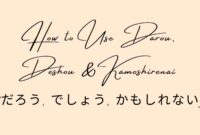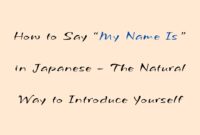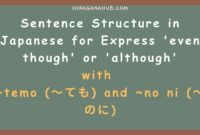Noun Conjugation in Japanese (Negation Sentence Structure)

Let’s dive into one of the fundamental lessons in Japanese grammar: the
conjugation of nouns, or meishi (名詞). This class will guide you step-by-step
through the process, making it simple and effective for learners of all
levels. Whether you’re just starting your journey to learn the language or
looking to refine your skills, this course is for you.
Noun conjugation in Japanese is surprisingly easy. With just a little
practice, you’ll master these expressions in no time. For beginners, pay close
attention, and for advanced learners, feel free to skip ahead or share
feedback!
Converting Nouns into Negative Forms
To express the negative form of a noun, simply add janai (じゃない) or dewa
nai (ではない) after the noun. Here are some examples:
- 犬 : inu (dog) → 犬ではない / 犬じゃない : inu dewa nai / janai (not a dog)
-
学生 : gakusei (student) → 学生ではない : gakusei dewa nai / janai (not a
student)
Example sentences:
-
私は学生ではない (Watashi wa gakusei dewa nai) I am not a
student. -
その人はアレックスじゃない (Sono hito wa Arekkusu janai) That person
is not Alex.
Converting Nouns into Past Forms
To describe a noun in the past tense, attach datta (だった) to it. Check these
examples:
- 子供 : kodomo (child) → 子供だった : kodomo datta (was a child)
- 先生 : sensei (teacher) → 先生だった : sensei datta (was a teacher)
Example sentences:
-
去年私は大学生だった (Kyonen watashi wa daigakusei datta) Last year,
I was a university student. -
みんな昔は子供だった (Minna mukashi wa kodomo datta) Everyone
was a child once.
Converting Nouns into Negative Past Forms
To form the negative past, start by conjugating the noun into its negative
form, then replace nai with nakatta (なかった).
Examples:
-
先生 : sensei (teacher) → 先生ではない / じゃない → 先生ではなかった /
じゃなかった (was not a teacher) -
人 : hito (person) → 人ではない / じゃない → 人ではなかった / じゃなかった
(was not a person)
Example sentences:
-
彼は先生じゃなかった (Kare wa sensei janakatta) He was not a
teacher. -
彼女は有名な人じゃなかった
(Kanojo wa yuumei na hito janakatta) She wasn’t a famous person.
Polite Conjugation for Nouns
For formal situations, the negative form of nai (ない) becomes arimasen
(ありません), and the past form datta (だった) becomes deshita (でした).
Examples:
- 私は学生です (Watashi wa gakusei desu) I am a student.
-
私はアメリカ人ではありません / じゃありません (Watashi wa Amerikajin dewa
arimasen / ja arimasen) I am not an American. - 私は会社員でした (Watashi wa kaishain deshita) I was an office worker.
-
私はユーチューバーではありませんでした / じゃありませんでした (Watashi wa
yuchuubaa dewa arimasen deshita / ja arimasen deshita) I was not a YouTuber.
Read other lesson:
Noun Conjugation Table
| Noun Casual | Noun Polite | Noun Casual Negative | Noun Polite Negative | Noun Casual Past | Noun Polite Past | Noun Casual Negative Past | Noun Polite Negative Past |
|---|---|---|---|---|---|---|---|
| gakusei | gakusei desu | gakusei dewa nai / janai | gakusei dewa arimasen / ja arimasen | gakusei datta | gakusei deshita | gakusei dewa nakatta / janakatta | gakusei dewa arimasen deshita |
| sensei | sensei desu | sensei dewa nai / janai | sensei dewa arimasen / ja arimasen | sensei datta | sensei deshita | sensei dewa nakatta / janakatta | sensei dewa arimasen deshita |
| inu (dog) | inu desu | inu dewa nai / janai | inu dewa arimasen / ja arimasen | inu datta | inu deshita | inu dewa nakatta / janakatta | inu dewa arimasen deshita |
| tomodachi (friend) | tomodachi desu | tomodachi dewa nai / janai | tomodachi dewa arimasen / ja arimasen | tomodachi datta | tomodachi deshita | tomodachi dewa nakatta / janakatta | tomodachi dewa arimasen deshita |
| kaisha (company) | kaisha desu | kaisha dewa nai / janai | kaisha dewa arimasen / ja arimasen | kaisha datta | kaisha deshita | kaisha dewa nakatta / janakatta | kaisha dewa arimasen deshita |
| hito (person) | hito desu | hito dewa nai / janai | hito dewa arimasen / ja arimasen | hito datta | hito deshita | hito dewa nakatta / janakatta | hito dewa arimasen deshita |
| isha (doctor) | isha desu | isha dewa nai / janai | isha dewa arimasen / ja arimasen | isha datta | isha deshita | isha dewa nakatta / janakatta | isha dewa arimasen deshita |
That’s all for today’s course on Japanese noun conjugation! Hopefully, this
online lesson helps you better understand how to use nouns in different
contexts. Keep practicing, and see you in the next class. Bye 😊


